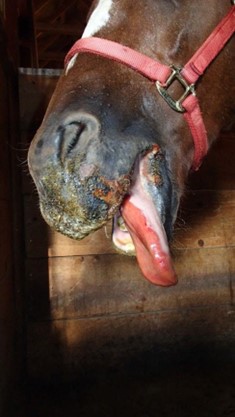 By Miriam Raftery
By Miriam Raftery
May 28, 2023 (San Diego’s East County) – The U.S. Department of Agriculture and the U.S. Equestrian Foundation (USEF) will hold a webinar on May 31 at 1 p.m. Pacific Standard Time on Vesicular Stomatis Virus (VSV), a contagious livestock disease that has spread to at least six different communities in San Diego County. Registration is required for the webinar, which will be held on Zoom. Register here.
Dr. Angela Pelzel McCluskey, USDA equine epidemiologist, will provide an overview of Vesicular Stomatitis and the current situation report also providing perspective based on her firsthand experience managing numerous VS outbreaks in her previous roles. Dr. Katie Flynn,USEF Equine Health and Biosecurity veterinarian, will cover prevention measures for horses and their premises, as well as the biosecurity requirements being implemented at those USEF events with horses competing from VS Affected States.
As of Friday, the U.S. Department of Agriculture reports that 23 properties are quarantined due to VSV, including 18 sites in San Diego County—seven more than in the last report five days earlier. All but one case in the outbreak have occurred in equine species such as horses, but there is one suspected case in a “backyard beef steer” at a local property with three cattle. The remaining cases are in Riverside County.
The USDA has not responded to our media inquiry for specific locations impacted in our region, but the Ramona Sentinel reports that the first six confirmed cases since the outbreak began May 17 were in Ramona, Lakeside, Campo, Jamul, Del Sur, and Descanso, according to local veterinarians. San Diego and Riverside counties are the only places in the nation with current cases.
Two properties previously quarantined have been removed. Quarantines last for 14 days or until a veterinarian clears infected animals as no longer contagious.
Though not usually fatal, the disease cause severe blister-like lesions on the mouths, hooves and sometimes other areas in livestock including equines such as horses and donkeys, cattle, pigs, sheeps, goats, llamas and others. The U.S. Centers for Disease Control lists several wildlife species that rarely have been confirmed with VSV, including deer, raccoons, rodents, feral pigs, and bobcats.
Animals can contract the disease from bites by black flies, midges, sand flies and possibly other insects and can also spread it through shared water or feed, and through contact with other surfaces.
The disease can spread to humans, but generally causes flu-like symptoms in people such as fever and fatigue.
Facilities should protect livestock through fly control and sanitizing methods to avoid spread of the disease. All suspected cases must be reported and animals with suspected or confirmed cases isolated until no longer contagious.
The U.S. Equestrian Foundation has implemented new biosecurity protocols required of all equine competitions by June 1.
This approach is less stringent than back in 2022, during an outbreak of equine herpes virus-1, an often lethal virus that forced cancellation of competitions.
Under the new USEF requirements, a veterinarian must examine all horses from outbreak-affected states on arrival and will bar entry if symptoms are evident. While onsite, the horses must have twice-daily temperature recordings and monitoring for vesicles,or lesions. Horses that develop fevers over 101.5 and/or vesicles will be isolated until the horse can be moved off the premises.
The disease takes about two weeks to run its course, though lesions can take up to two months to clear up. There is no cure, though treatments are available for infection and to reduce discomfort, since the disease often makes it painful for animals to eat or walk.
For more information, visit these sites.
U.S. Department of Agriculture page on VSV:
USDA latest update on VSV outbreak May 26,2023:
https://www.aphis.usda.gov/animal_health/downloads/animal_diseases/vsv/sitrep-05-26-23.pdf
Calfornia Department of Food and Agriculture page on VSV:
https://www.cdfa.ca.gov/AHFSS/Animal_Health/VS.html
U.S. Equine Foundation information on VSV biosecurity for competitions:
https://www.usef.org/compete/resources-forms/competition-management/competition-safety-biosecurity
East County Magazine’s prior articles on the VSV outbreak:
https://www.eastcountymagazine.org/quarantines-imposed-vsv-livestock-disease-spreads-across-region
https://www.eastcountymagazine.org/vesicular-stomatitis-virus-found-local-horse-more-cases-suspected
Ramona Sentinel/San Diego Union-Tribune article on VSV:
U.S. Centers for Disease Control info on VSV and other equine diseases: https://www.cdc.gov/healthypets/pets/horses.html







Recent comments